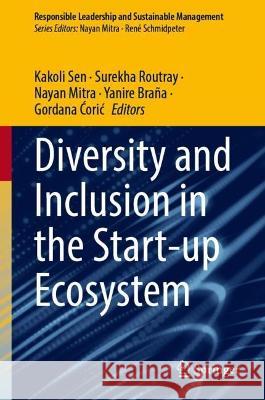Diversity and Inclusion in the Start-Up Ecosystem » książka
topmenu
Diversity and Inclusion in the Start-Up Ecosystem
ISBN-13: 9789819953653 / Angielski / Twarda / 2023
Diversity and Inclusion in the Start-Up Ecosystem
ISBN-13: 9789819953653 / Angielski / Twarda / 2023
cena 682,72
(netto: 650,21 VAT: 5%)
Najniższa cena z 30 dni: 616,85
(netto: 650,21 VAT: 5%)
Najniższa cena z 30 dni: 616,85
Termin realizacji zamówienia:
ok. 22 dni roboczych
Dostawa w 2026 r.
ok. 22 dni roboczych
Dostawa w 2026 r.
Darmowa dostawa!
This book is about the lack of inclusion in the startup ecosystem for women entrepreneurs in India as well as the world due to which the challenges they face and how we can create inclusive ecosystem for women as well as other marginalised sections of the society. The twelve chapters of the book address a wide range of areas such as how entrepreneurship education may help create higher entrepreneurial intentions and how mentoring can help these first-time entrepreneurs set up, manage, sustain, and scale their startup. The international chapter authors in this book have written from different parts of the world such as Israel, Germany etc. and shared the challenges women or people from other marginalized sections of the society such as People with Disabilities across the world face. Some of the authors have written about sustainable businesses such as Green startups and green finance, revival of age old crafts by way of Diversity and Inclusion, how Covid has impacted women entrepreneurs and others. The chapters also offer action points that government, policy makers, incubators, accelerators, investors, universities can take up and create an integrated and inclusive eco-system that will offer end to end solutions for creating entrepreneurial intention among people from all walks of the society irrespective of gender, age, social status, disabilities, caste or creed. Anyone who is interested in becoming an entrepreneur or wants to help others who have entrepreneurial intention should read this book and see how it could benefit them as well as where and how they could contribute. Any corporate with an aim to extend their CSR activities and support these startups could learn how some other corporates are doing this. Aspirational women entrepreneurs could read it and find support at the right places.











